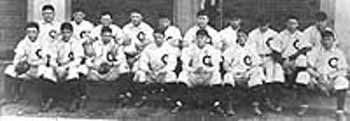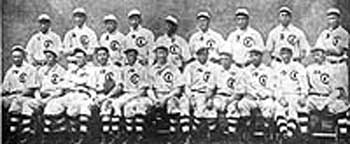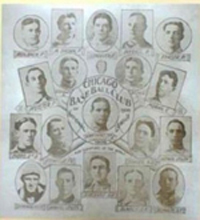|
|
 |
|
Everybody knows the Cubs haven't been a post season threat since the early 1900's. But that doesn't mean those years should be forgotten. The following is how the Cubs have fared in post-season play. Before the modern playoff system, the National League had a championship of it's own. The Cubs won this tournament in 1876, 1880, 1881, 1882, 1885, and 1886. After the turn of the century, Chicago won the National League pennant 10 times (1906, 1907, 1908, 1910, 1918, 1929, 1932, 1935, 1938, and 1945). The World Series was a different story, though. The Cubs have only won the title in 1907 and 1908. Here's a re-cap of those Series:  With the Detroit Tigers ahead, 3-2, in the ninth inning of Game 1 of the 1907 World Series, Del Howard was called upon to bat for Cubs shortstop Joe Tinker in a two-on, two-out situation. Harry Steinfeldt was on third base for Chicago and Johnny Evers was perched on second. Bill Donovan was pitching for the Tigers, and the advantage clearly was with the American League champions. Donovan, after all, had fashioned a 25-4 record. Howard, a June acquisition from the Boston Braves, had batted only .230 for the Cubs. Sure enough, Donovan struck out Howard. Tiger fans couldn't have asked for more. Except, maybe, for catcher Charlie Schmidt to hang on to the ball. Schmidt didn't. And as the ball got away from the second-year major leaguer, Steinfeldt raced home with the game-tying run. Donovan retired the side, but the real damage had been done. The teams remained in a deadlock through three more innings, and then the game was called because of darkness. Tigers 3, Cubs 3, 12 innings. Detroit had let certain victory -- and momentum -- slip out of its grasp. And Manager Hugh Jennings' Tigers would pay dearly. Given a reprieve, the Cubs proceeded to make short shrift of the Tigers. Detroit, which had edged the Philadelphia Athletics in a fiercely contested American League pennant race, failed to score more than one run in any of the remaining Series games. Chicago's Jack Pfiester handcuffed Detroit, 3-1, in Game 2 and Ed Reulbach stymied the AL champs, 5-1, the next day. The Tigers seized a 1-0 lead in the fourth inning of Game 4 as 20-year-old Ty Cobb, having just won his first batting championship, slammed a triple and scored on Claude Rossman's single. But Detroit did nothing else of note against Orval Overall and went down to a 6-1 defeat. Overall himself put the Cubs ahead with a two-run single in the fifth inning. In Game 5, Mordecai Brown spun a seven-hitter and the Cubs swept to a Series-clinching 2-0 triumph. That the Cubs were primed to atone for their 1906 embarrassment at the hands of the Chicago White Sox was a given. That Frank Chance's team would make amends in such a dominant manner was not wholly anticipated. But dominate the Cubs did. They ran wild against the Tigers, stealing seven bases in Game 1 and finishing the Series with 18. They got outstanding offensive production from Steinfeldt and Evers, who batted .471 and .350, respectively (with Steinfeldt getting seven hits in the last three games of the Series and Evers getting seven in the first three games). And, most of all, the Cubs exhibited exquisite pitching. Pfiester, Reulbach, Overall and Brown threw 43 scoreless innings out of 48 and shut down the American League's top hitters of 1907, Cobb and Sam Crawford. Cobb managed only a .200 average in the Series after batting .350 in the regular season; Crawford hit .238 after a .323 season. The Cubs, of course, had the potential to crush any opponent, as evidenced by their second consecutive runaway in the National League. In 1907, the Cubs won 107 games and finished 17 games ahead of the Pittsburgh Pirates. And, given a second chance in two years to demonstrate their apparent supremacy over the rest of major-league baseball, the Cubs made the most of the opportunity this time.  After winning 223 games over the previous two National League seasons and building huge pennant-winning margins, the Chicago Cubs went about the business of winning a league championship in a vastly different manner in 1908. Oh, the Cubs had another outstanding season, all right, winning 99 games. But had it not been for a base running blunder by the New York Giants' Fred Merkle, Chicago would have finished with 98 victories -- and been on the outside looking in. In a September 23 Cubs-Giants game, Merkle failed to touch second base when Al Bridwell delivered an apparent game-winning hit in the bottom of the ninth inning. By the time the Cubs retrieved the ball and eventually forced Merkle at second, fans had swarmed the field. With order impossible to restore, the game was declared a 1-1 tie. As things turned out, Chicago and New York wound up with 98-55 records, meaning the "Merkle game" would have to be made up. In an October 8 replay, the Cubs scored a 4-2 victory and left the Giants agonizing over what might have been. Or even what should have been. The Chicagoans, on the other hand, were reveling in what was. Having repeated as NL titlists by the barest of margins (the Pirates, like the Giants, finished one game behind Chicago), the Cubs prepared for a second consecutive World Series against the Detroit Tigers, who had won the American League championship on the final day of the regular season. As was the case the previous year, the Tigers held the lead entering the ninth inning of the Series opener. And, as in 1907, Detroit frittered away the advantage. This time, the Tigers suffered a worse fate than being tied. With his club ahead 6-5 in the ninth, Detroit pitcher Ed Summers retired Johnny Evers to start the inning. Summers, a 24-game winner in 1908, then yielded six consecutive hits and five runs, the go-ahead runs scoring on a bases-loaded single by Solly Hofman. The Cubs pulled out all the stops en route to a 10-6 triumph, using Orval Overall and Mordecai Brown in relief roles behind Ed Reulbach.  The Tigers' Bill Donovan was paired against Overall in Game 2, and the right-handers put on quite a show. Through four innings, neither pitcher had allowed a hit in a 0-0 standoff. After seven innings, the Tigers had three hits and the Cubs only one (by Overall), as the game remained scoreless. Overall proceeded to retire the Tigers in order in the top of the eighth, but Donovan ran into trouble in the bottom of the inning. Big trouble. After Harry Steinfeldt singled, Joe Tinker poked a home run to right field. And before the inning was over, the Cubs had four more hits and four more runs. Ty Cobb delivered a run-scoring single in the ninth for Detroit, but Overall and Chicago prevailed, 6-1. The Cubs had won their sixth consecutive Series game from the Tigers. Detroit finally broke through in Game 3, with George Mullin checking the Chicagoans on seven hits in an 8-3 victory. Cobb had four hits and two RBIs. Brown quieted any rising Tiger fervor, however, by recording a four-hit, a 3-0 triumph in Game 4. And overall, so magnificent three days earlier, was at the top of his game again in Game 5. The 27-year-old Californian allowed only three hits and struck out 10 batters and, backed by three hits and RBIs from Evers and Manager Frank Chance, was a 2-0 winner. Only 6,210 fans witnessed the finale in Detroit, the smallest crowd in Series history. The Cubs ruled major-league baseball, becoming the first team to win back-to-back World Series titles. And those championships had come on the heels of their record 116-victory season of 1906. In sports, the word "dynasty" just might have applied for the first time in October 1908. Recently, the Cubs have won the Central Division title in 1984 and 1989. They won the Wild Card in 1998. |
|
 | |


